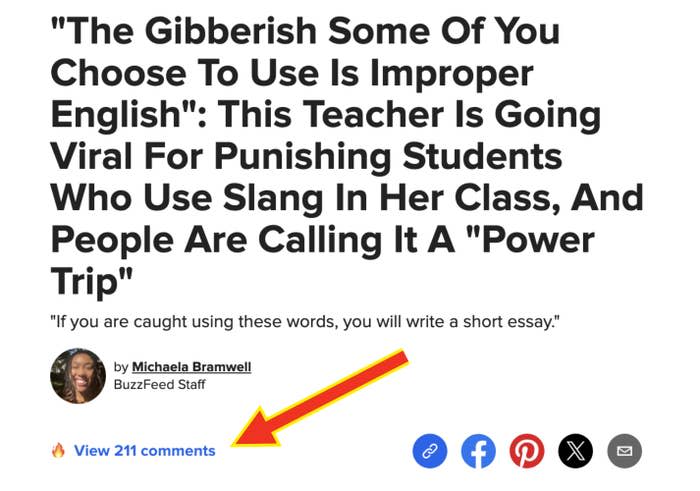A Teacher’s List Of Slang Words Banned In Their Class Went Viral, And These 20 People Weighed In With Wildly Different Opinions
An English teacher's now-viral list of prohibited classroom words has been seen by over 33 million people, sparking a debate about slang use in a classroom setting — should it be allowed?
How yall feel bout this ? pic.twitter.com/JRC8raLh3f
— 𝓈𝒶𝑔𝒾𝓉𝑒𝓇𝓇𝑜𝓇𝒾𝓈𝓉★ (@hearts4zaniyahh) January 7, 2024
@hearts4zaniyahh
A recent BuzzFeed post shared online reactions to the list, including a range of opinions from teachers, parents, and students on Twitter. Well, after reading that, the BuzzFeed Community had a lot of opinions of their own, leaving over 200 comments on the original post.

So, I decided to showcase some of the most popular opinions:

1."The majority of students cannot read at grade level. Anyone who disagrees with a teacher teaching appropriate grammar is part of the problem."
2."She’s helping them become writers for any career. If I call someone 'Bruh' while trying to apply for a job, I’m not going to get a second glance. My white nieces and nephews use these terms all the time, not EVERYTHING is race related!"
3."I'm an English teacher in France, and one of our lessons is on slang and how important it is connected to culture, and how it is super important to know because it is so widely used. I don't call this teaching."
4."This teacher is my hero. I, for one, have had it with the poor grammar and elocution that is so prevalent in our society."
5."A teacher should NEVER punish behavior with writing. All that does is make kids equate writing with punishment. I'm a teacher, and yes, I'll take off points if your language is too informal in a formal assignment, but I'm not going to make you write an essay about it and hate me and English class forever."
6."Has anybody pointed out that arguably the most famous, widely recognized playwright in history legit just made up words on the regular, many of which are widely used and accepted today? I’m not necessarily saying that any current slang is going to be considered 'proper' English 500 years from now, but to act like language doesn’t evolve even in the written word is ignorant."
7."She is an English teacher. Her job is to teach students to use English. There is no implied judgment about students’ preferred personal communication styles. The job of pupils in that class is to learn and to demonstrate 'proper' English."
"They can’t use 'Spanglish' or Creole or Mandarin Chinese. Outside of class or in informal settings, students may use sign language or Morse code or hieroglyphics or any language system that suits their needs. In English class, it would be a disservice to accept anything other than standard English."
8."As a seventh-grade ELA teacher, this is overreach. I am beyond sure that this teacher, regardless of their age, uses some sort of slang in their speech. Do they say cool? Hanging out? Legit?"
"Language is continuing to evolve, and conversational language should not be punished. Unless they are using foul language (which only a couple of these words are), there is no reason for this besides the irritation of an adult."
9."AAVE is an entirely valid form of speaking, and to try to enforce a list like this is just straight prejudice on behalf of the teacher. If you want students to use proper grammar and spelling in things like essays, that’s one thing, but aside from using profanity or slurs in the classroom, there is no valid reason for a teacher to police how students speak."
"Hell, I have my degree in English literature, and increasingly there are classes that are incorporating the study of different vernaculars in English lit because it’s become so prolific especially with the increase in post-colonial writings and studies. This is just a teacher on a power trip."
10."Parents should be supporting their children’s teachers! The moment the children step past that threshold and into her classroom, there are specific expectations regarding their education! This is the bare minimum this teacher, who is considered an educated expert in her field, should be asking of her students! If this teacher did not care, she would let the children decide how English shall be taught!"
"Instead, this teacher is teaching them real world responsibilities toward one’s own education! This teacher, a professional educator, is NOT 'anti-black.' Seriously? This educator is 'anti-low-test-scores.' This educator is fairly laying the groundwork for if these students would like to pursue any type of higher education. This educator is teaching the proper way our education system has decided our children should write and communicate. I don’t know any university that would accept this kind of grammar used by some of her students! Or any abroad!"
11."I have a degree in English and did not enjoy my undergrad grammar courses. However, knowing the rules of written language is a must. Once you understand the foundation, you can have a great time with linguistics."
12."I'm a teacher and get called 'Bruh' about five times a day, and students have no idea how disrespectful it sounds."
13."Language is fluid. Drop this teacher in 14th-century England (pre great vowel shift) and let’s see if she is regarded as speaking 'properly.' Where I teach, 90% of my students are people of color. I am white. Having my students write in their natural AAVE allows for such rich and amazing insight. This is elitist BS. Who gets to determine what is 'proper?'"
"Traditional is not always right, and new is not always wrong. Embrace the changes and you will see and hear things you can’t begin to imagine. If academia would throw out old prejudices, school can become a place of inspiration instead of boring compliance. Stop promoting and enforcing code-switching."
14."Teaching students how to code-switch is beneficial for their futures. Forbidding students from using current slang is white supremacy rooted in colonialism."
15."Students should be able to talk how they want, as long as they’re respectful and not using slurs. The way you speak isn’t how you write. I’m a casual, slangy speaker and also a professional writer, often with a more formal tone."
"Some of these students are probably phenomenal writers — whether they speak in slang or not. Also, most of this list is AAVE, which should be encouraged in the classroom! AAVE isn’t improper English, and it’s important to educate students about all kinds of ways of speaking!"
16."Language grows and evolves. Unlike this teacher."
17."As a teacher, who cares? Students should get to talk to and express themselves however they want. There's a difference between speaking casually and diplomatically, and they can be taught that. She just sounds controlling, and that sucks."
18."Saying it's anti-Black is racist. Black people aren't stereotypes who only speak in one way. As a former English teacher in a Anglophone educational setting, it's literally her job to insist on good standards of English in the classroom. I actually think it's refreshing to see a teacher working to level up her students' use of language. They can resort to using their slang in other classes and on their own time."
19."I don't care how a person speaks in conversation, but now that I supervise younger attorneys, I'm amazed how many don't know how to write formally. I spend way more time than I used to having to edit written work for basic clarity (rather than technical/legal correctness)."
"Knowing when slang is acceptable and when not to use it is a huge part of professional communication, and while the teacher's delivery of that lesson may not be perfect, it is still an important lesson for future professionals."
20.And finally, "Outside of cursing or slurs, she should let them speak how they do, but also let them know it can’t be used in their written assignments unless contextually appropriate. Seems like a great opportunity to facilitate a conversation with the students rather than a punishment."
What do you think? Let us know in the comments below.


